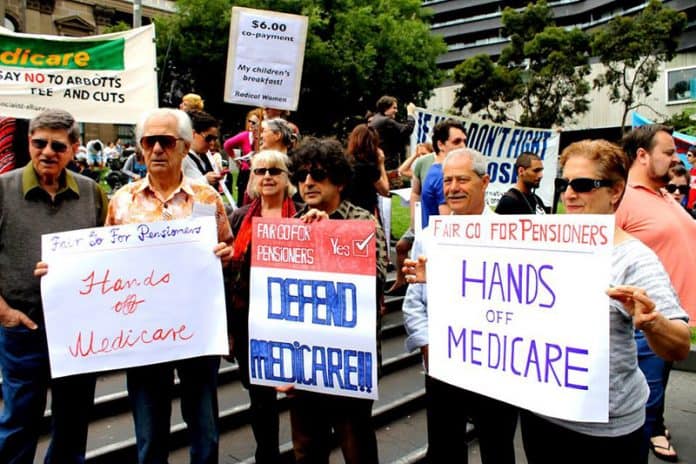Incredibly, just months after he came to power, both Newspoll and Nielsen polls revealed in December that Abbott has slumped to a position where he would now lose an election. The government has over-reached on a whole number of issues.
Its performance in the polls is the worst for any government so soon after an election in 40 years, according to pollster John Stirton.
There is already a widespread disgust and hatred for Abbott that can be mobilised into fighting his agenda. Over 140,000 people signed a petition within days to protest the refusal of a partner visa for gay Pakistani man Ali Choudry in January.
Education Minister Chris Pyne was forced into an embarrassing backdown after he announced plans to scrap the schools funding formula the Coalition had pledged to keep at the election.
The government’s public attacks on Holden in the days before it announced its closure showed their contempt for the jobs of Holden workers. But sadly the widespread sympathy that could have supported a fight for jobs was squandered by the union leaders.
Abbott has effectively declared war on asylum seeker boats, with reports of the navy firing shots and towing boats back to Indonesia. This is a high stakes policy which risks the loss of lives and shows the government’s desperate fear that it might not be able to “stop the boats” as it has promised.
Preparing for cuts
It is clear the Liberals are trying to prepare the ground for cuts. So far Abbott has been cautious, ruling out ideas such as privatising Australia Post and HECS debts when they surfaced. But when the idea for a $6 fee for Medicare bulk-billed visits to the GP was raised, the government refused to rule it out.
This episode has the fingerprints of the Liberal Party all over it. The idea came from former Liberal Party adviser Terry Barnes, in a submission to the government’s Commission of Audit. While the government has not yet said it will implement the fee, Health Minister Peter Dutton responded by saying that Medicare spending was “unsustainable” and there was a need to cut costs.
Abbott is trying to engineer a barrage of propaganda in the media about supposed government over-spending.
Treasurer Joe Hockey has said he wants to start “a national conversation about how we can live within our means” and declared that “the government is spending too much money”.
He used his mid-year economic statement in December to talk up the size of the deficit. While the deficit has grown from $30 to $47 billion since the election, $10.3 billion of this is because of the Liberals’ own decisions. And at the same time as Hockey talks up the need to cut spending, the Treasury Department wants more spending on economic stimulus to avoid a recession.
So in all likelihood, Hockey’s cuts will be about shifting money around to advance the Liberals’ ideological agendas—like user pays and privatisation along with spending on infrastructure on big business’ wish list.
The Medicare fee is a prime example. It would hit the poorest in society the hardest, and further undermine the principle of a free, universal health system. The Liberals have long hated the public health system, pushing people into private health insurance by introducing the private health rebate under John Howard, and insisting that user-pays is the only way to expand the health system.
But Abbott and the Liberals know they have no mandate for cuts from the election. They even agreed to match Labor’s NDIS spending and its new schools funding formula for the first four years. So they are worried about how much they can get away with.
Large protests to demand they rule out the Medicare fee plan will force the government to rethink their attacks. In Sydney 400 turned out to a save Medicare rally with just days notice on 4 January.
We need to use the period in the lead up the budget in May, when their final plans will be revealed, to build up activist networks capable of fighting whatever cuts the Liberals come up with. Mobilising union members will be particularly important—the unions put hundreds of thousands on the streets to oppose WorkChoices under Howard. But getting this response required a fight inside the union movement. Much of the union leadership had to be pushed into calling demonstrations.
The rallies that have already been called to defend Medicare around the country are a good start. They can be used to both defend the public health system and to combat the Liberals’ ideological offensive about the need for cuts.
If they are large they will build momentum and pressure for a broader union response.
With their attacks on refugees central to the Liberals’ agenda, we also need to keep opposition to their fortress Australia policies prominent. As they face more and more problems both turning around boats and in the detention centres, a campaign capable of seizing on the opportunities to turn public opinion around will be key.






